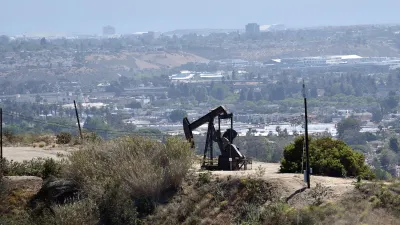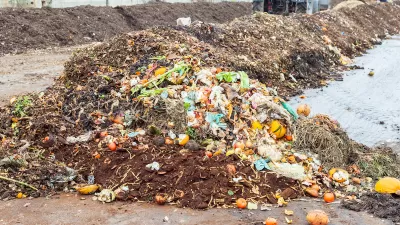We shouldn't be blaming biofuel production for rising food prices and environmental degradation while ignoring the immense harm of industrial meat production, writes Frances Cerra Whittelsey.
"Biofuel critics...often frame the problem as a choice between feeding people and feeding SUVs; they blame rising food prices on diverting food crops to fuel production. But it's false to frame the biofuel debate as a choice between people or SUVs.
The shocking fact is that production of beef, pork and poultry is a bigger part of the climate problem than the cars and trucks we drive, indeed of the whole transportation sector...the meat industry is a giant source of greenhouse gases, of which carbon dioxide is only one, and not the most dangerous one. All those steer feedlots and factory buildings crammed with pigs and chickens produce immense amounts of animal wastes that give off methane. On an equivalent basis to carbon dioxide, methane is twenty-three times more potent as a greenhouse gas. When you add in the production of fertilizer and other aspects of animal farming (including land use changes, feed transport, etc.) livestock farming is responsible for nearly one-fifth of human-induced greenhouse gas emissions, more than the transportation sector, according to a 2006 report by the Food and Agriculture Organization of the United Nations.
Reducing our addiction to meat may not be popular, but we need to view our love affair with burgers and barbecue in the same frame as gas-guzzling SUVs."
FULL STORY: Eating Meat Is Worse Than Driving a Truck ... for the Climate

Alabama: Trump Terminates Settlements for Black Communities Harmed By Raw Sewage
Trump deemed the landmark civil rights agreement “illegal DEI and environmental justice policy.”

Study: Maui’s Plan to Convert Vacation Rentals to Long-Term Housing Could Cause Nearly $1 Billion Economic Loss
The plan would reduce visitor accommodation by 25% resulting in 1,900 jobs lost.

Planetizen Federal Action Tracker
A weekly monitor of how Trump’s orders and actions are impacting planners and planning in America.

Wind Energy on the Rise Despite Federal Policy Reversal
The Trump administration is revoking federal support for renewable energy, but demand for new projects continues unabated.

Passengers Flock to Caltrain After Electrification
The new electric trains are running faster and more reliably, leading to strong ridership growth on the Bay Area rail system.

Texas Churches Rally Behind ‘Yes in God’s Back Yard’ Legislation
Religious leaders want the state to reduce zoning regulations to streamline leasing church-owned land to housing developers.
Urban Design for Planners 1: Software Tools
This six-course series explores essential urban design concepts using open source software and equips planners with the tools they need to participate fully in the urban design process.
Planning for Universal Design
Learn the tools for implementing Universal Design in planning regulations.
Caltrans
Smith Gee Studio
Institute for Housing and Urban Development Studies (IHS)
City of Grandview
Harvard GSD Executive Education
Toledo-Lucas County Plan Commissions
Salt Lake City
NYU Wagner Graduate School of Public Service





























